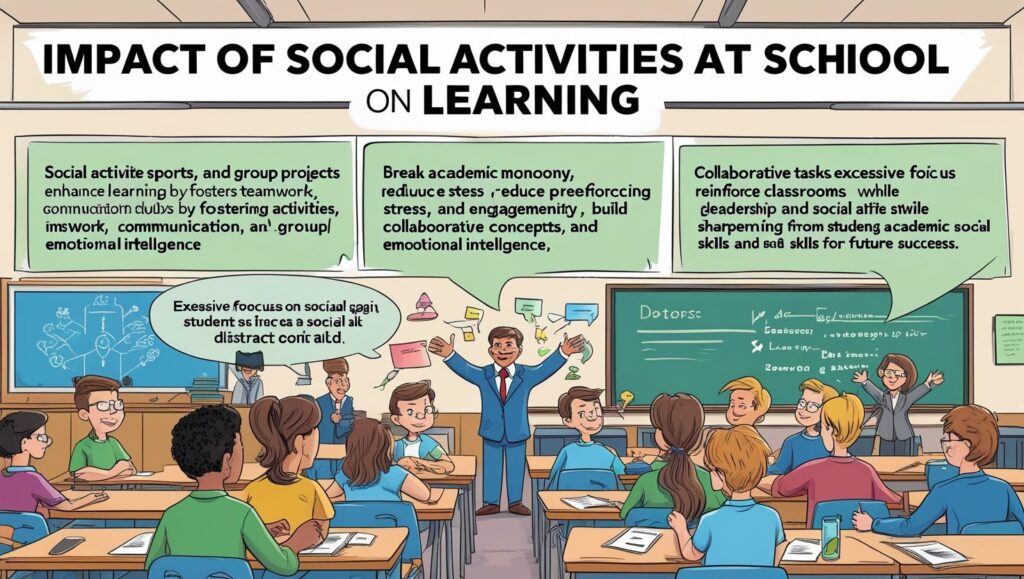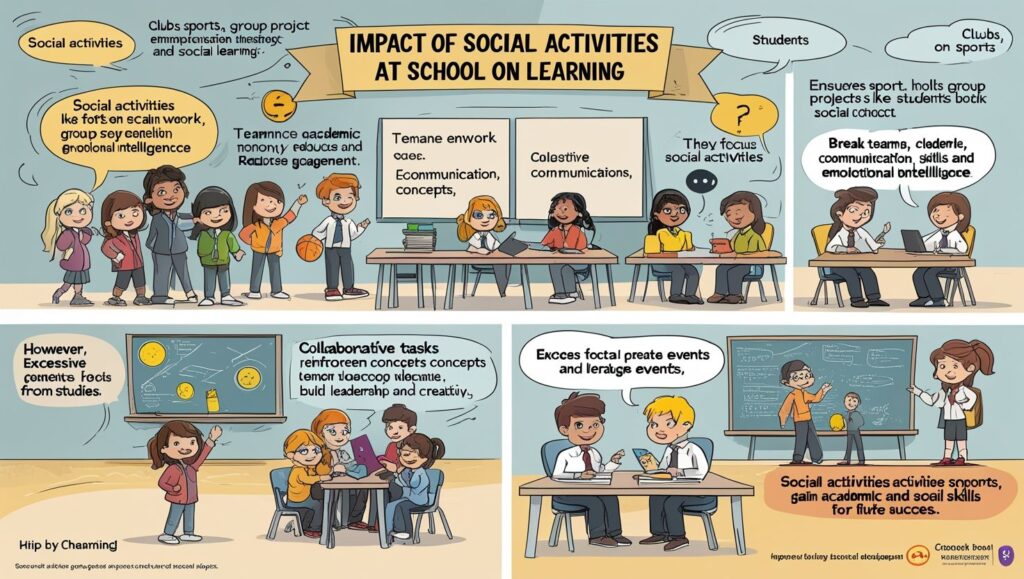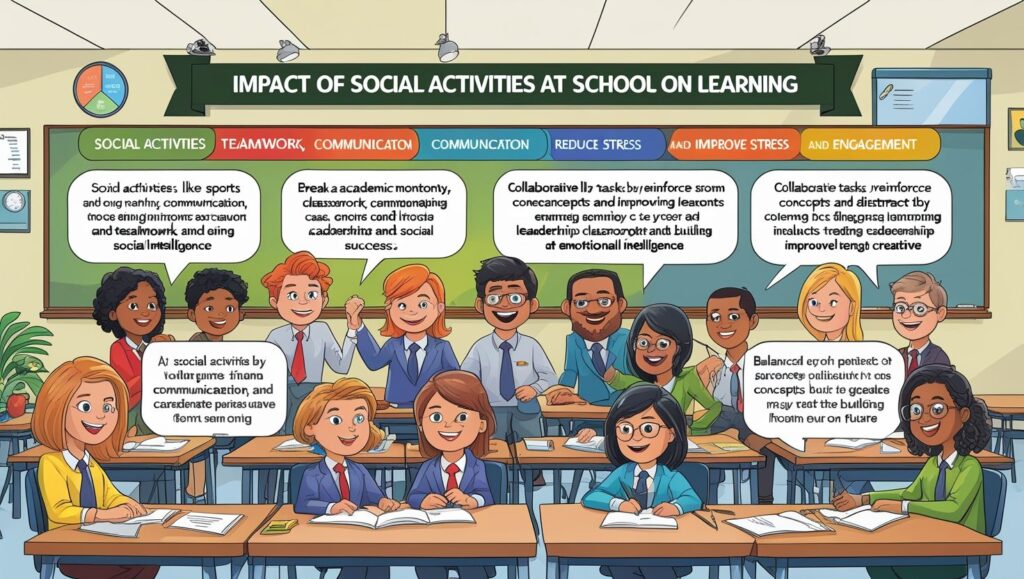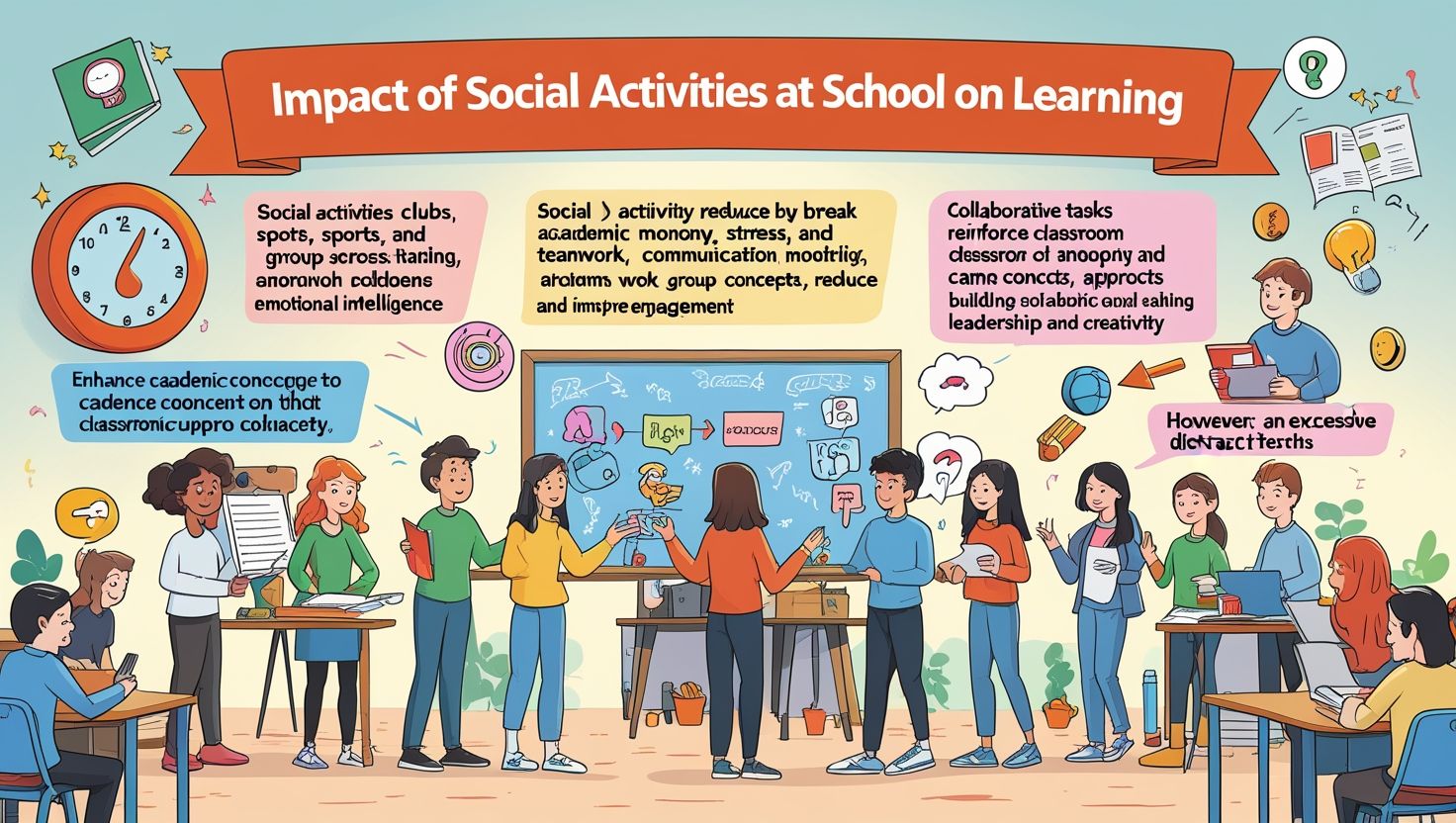Introduction:
Impact of Social Activities at School on Learning, Social activities at school play a vital role in the holistic development of students. While academics are important, learning does not only happen in books. It also takes place in hallways, playgrounds, and during group projects. Through these social activities, students learn essential life skills. Moreover, such activities help students build confidence and develop communication skills. They learn how to interact respectfully and solve conflicts peacefully. These experiences shape their character. Although often overlooked, social learning is just as significant as academic learning.
Furthermore, group tasks, school clubs, and team sports offer students a chance to collaborate. As they participate, they also understand diversity and inclusion. These are critical in a globalized world. Therefore, social engagement contributes to emotional intelligence and resilience. In addition, students become more connected to their school environment. This leads to a sense of belonging. When they feel accepted, they perform better academically. Overall, the inclusion of social activities enhances both educational outcomes and personal growth.
Boosting Communication and Interpersonal Skills
Social activities naturally push students to interact. Whether it’s in debates, drama clubs, or sports teams, communication is key. Students learn to express themselves. They also become better listeners. As a result, their interpersonal skills improve significantly. Besides that, they learn the importance of body language and tone. For instance, during a school play, students must convey emotions clearly. This helps them understand verbal and non-verbal cues. Consequently, their empathy also grows.
Furthermore, students work in pairs or groups. Here, they share ideas, give feedback, and solve problems together. Because of this, they develop respect for different perspectives. This is crucial in both academic and social life. Also, strong communication skills support academic performance. For example, students can better participate in class discussions and group assignments. Hence, learning becomes more engaging and collaborative.
In short, social activities allow students to practice and polish communication skills daily. Over time, these interactions become a foundation for future success in school and beyond. Thus, the impact is long-lasting and deeply meaningful.

Enhancing Teamwork and Leadership Qualities
Social activities promote teamwork. Most events involve groups—sports teams, science clubs, or student councils. Students must work together to achieve common goals. This experience teaches cooperation and trust. Each member learns to value the efforts of others. In addition to teamwork, students also get chances to lead. When organizing an event or guiding a group, they develop leadership skills. These include planning, managing time, and delegating tasks. Eventually, they also learn to take responsibility for their actions.
Moreover, such experiences shape future leaders. Through leading, students become more confident. They learn how to motivate others. At the same time, they become role models for their peers. Also, leadership through social activities prepares students for real-world challenges. It enables them to manage conflicts, make decisions, and handle pressure. Therefore, these skills are not only relevant at school but throughout life.
In conclusion, teamwork and leadership are nurtured through consistent participation in social events. These qualities enrich the learning environment. Consequently, they make students better prepared for academic and future success.
Improving Academic Engagement and Motivation
Interestingly, social activities influence academic engagement positively. Students involved in clubs or teams often feel more connected to their school. This connection increases motivation. They attend classes regularly and participate more actively. Furthermore, when students enjoy school, they learn better. For example, a student who plays in a music band may develop better concentration. Likewise, being in a science club can boost curiosity. Both lead to academic improvement.
In addition, peer support in social groups helps struggling students. Friends encourage each other to study and do well. Group study sessions and mentorship programs grow from these social ties. Moreover, rewards from social activities, such as praise or recognition, inspire students. They begin to set goals. They aim higher, not only in activities but also in studies. This creates a cycle of success.
Therefore, social involvement builds a positive mindset toward education. It breaks monotony and reduces academic stress. Hence, when students are socially active, they are more engaged and motivated. This directly enhances the quality of their learning experience.
Fostering Emotional Intelligence and Self-Awareness
Social activities nurture emotional intelligence. Students learn to recognize and manage their emotions. At the same time, they develop the ability to understand others’ feelings. This is especially true during collaborative projects or team events. Through participation, students face different situations. They win, lose, compete, and cooperate. Each situation teaches them to deal with emotions. This builds emotional strength. As a result, students become more self-aware.
Additionally, social activities promote reflection. After a group activity, students often think about what went well and what didn’t. This reflection improves their decision-making and emotional control. Moreover, students start identifying their strengths and weaknesses. For example, a shy student in a debate team may discover they are a good speaker. This boosts confidence and helps in setting future goals.
Because emotional intelligence affects all areas of life, it is a crucial skill. It helps in academics, relationships, and career development. Thus, schools must give equal importance to social activities. They shape emotionally intelligent learners ready for life’s challenges.

Building Positive Peer Relationships
Friendships formed through social activities are often stronger. Students find common interests and spend quality time together. This shared experience fosters mutual respect. As they interact more, their bonds become deeper. Additionally, these relationships offer emotional support. During tough times, peers help each other. Whether it’s a difficult subject or a personal issue, friends made in clubs or teams are often reliable.
Also, such peer relationships encourage healthy behavior. When surrounded by positive influences, students are less likely to engage in risky habits. Good friends often motivate each other to stay focused and responsible. Furthermore, conflict resolution is a natural part of peer interaction. Students learn to compromise and forgive. These lessons are valuable in school and in life.
Moreover, these friendships enhance a student’s sense of belonging. When students feel accepted, they are happier. This happiness contributes to a better learning environment. In conclusion, positive peer relationships built through social activities help create emotionally and academically strong individuals. These connections promote unity and harmony in the school environment.
Encouraging Inclusion and Reducing Bullying
Social activities often bring diverse groups together. Students of different backgrounds, abilities, and cultures join the same clubs or teams. This helps break stereotypes and encourages inclusion. Moreover, working together helps students understand each other. When they interact, they begin to see similarities instead of differences. This reduces prejudice and promotes acceptance.
In addition, inclusive activities create safe spaces. Students with disabilities or those from minority groups feel valued. They participate confidently. Consequently, bullying decreases, and kindness increases. Also, teachers and facilitators play a key role. They ensure every child is involved. When adults support inclusion, students learn to do the same.
Furthermore, schools that prioritize social events send a strong message. They say that every student matters. This builds a culture of respect and care.
As bullying reduces, students feel safer and more relaxed. A safe environment supports better learning. Thus, inclusive social activities help in both emotional well-being and academic progress. In short, schools must promote inclusive events. These strengthen unity and eliminate discrimination.
Developing Time Management and Organizational Skills
Social activities require planning. Students must balance schoolwork and extracurricular tasks. This teaches them time management. They learn to prioritize and schedule their day. Moreover, organizing events or managing responsibilities improves efficiency. Whether it’s preparing for a school play or leading a club meeting, students must follow timelines. This develops discipline.
Additionally, managing multiple roles builds flexibility. Students switch between tasks and adjust as needed. This prepares them for real-world demands. Furthermore, being organized reduces stress. When students plan well, they feel in control. This leads to better performance in both activities and studies.
Also, these skills support academic success. Students who manage their time well often meet deadlines and prepare better for exams. Thus, learning is more effective. In conclusion, participation in social events sharpens time and task management. These are lifelong skills. They help students become responsible, independent, and successful individuals. Therefore, such learning should be encouraged by schools consistently.

Strengthening School Culture and Student Identity
A strong school culture is built on shared values. Social activities promote these values. Events like cultural shows, sports days, and community service reflect the school’s spirit. When students participate, they feel connected to their school. Moreover, active involvement builds pride. Students take ownership of their school’s image. They represent their school in events and competitions. This sense of identity strengthens their bond with the institution.
In addition, traditions formed through social activities build memories. These moments stay with students forever. They often shape how students view education and relationships. Also, shared experiences unite students and staff. This creates a positive atmosphere. In such a space, learning thrives. Respect, care, and collaboration become daily practices.
Furthermore, students begin to understand the role of community. They see how their contributions matter. This awareness boosts their confidence and sense of purpose. Overall, social activities make school life meaningful. They define school culture and personal identity. Hence, schools must invest in a variety of programs to build strong, united learning communities.
Conclusion: Lifelong Lessons from Social Learning
Social activities are not extra—they are essential. They complete the learning process. Through them, students grow in communication, leadership, empathy, and self-awareness. These are not just school skills. They are life skills. Moreover, such activities make learning joyful. They reduce stress and bring students closer. In this way, school becomes more than just a place to study. It becomes a place to live, laugh, and learn together.
In addition, students discover their passions. Whether in art, sports, or service, they find their unique talents. This discovery often guides career choices and future goals. Furthermore, the habits built during social events—like planning, teamwork, and respect—shape character. These habits last beyond school years. They prepare students to face life with confidence and kindness.
Therefore, schools should value and promote social engagement. With the right mix of academics and social learning, education becomes truly effective. It prepares students for both success and humanity. In conclusion, social activities are the heart of a vibrant, inclusive, and meaningful education. They truly enrich learning, one interaction at a time.

quuazh
Hi, just required you to know I he added your site to my Google bookmarks due to your layout. But seriously, I believe your internet site has 1 in the freshest theme I??ve came across. It extremely helps make reading your blog significantly easier.
I am extremely impressed withh yojr writing skulls as well as wih the latout on yopur
blog. Is this a paiod theme or did you modify it yourself?
Either way keep up the nice quality writing, it’s rare to see a great blog like
this one these days. https://Glassi-India.Mystrikingly.com/